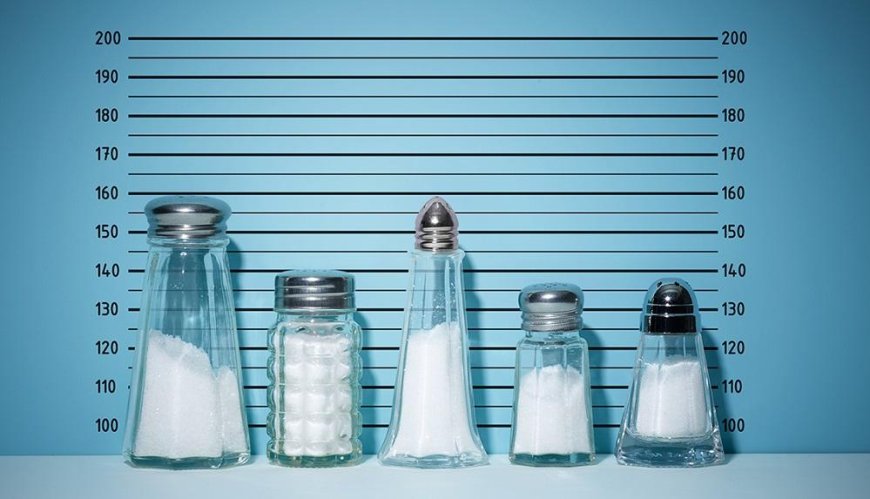Daily salt intake: how much should it be?
Daily salt intake is one of the most used spices that is always present in our kitchen. However, it can be harmful to health in large

Daily salt intake is one of the most used spices that is always present in our kitchen. However, it can be harmful to health in large amounts. This is why you should find out what your daily salt intake is.
Nutritionists recommend following a diet low in salt. Surely you hear these guidelines a lot. Hence, you may begin to wonder what your daily salt intake should be.
Today, our parents and grandparents know that salt is associated with high blood pressure. But how much salt can we safely consume? Too much salt is the source of many health problems. That's why it's worth finding out more.
Sodium: the main culprit
The salt we use in cooking contains at least 40 percent sodium. The human body needs an adequate amount of sodium to ensure the correctness of all body processes. However, these are not large amounts.
Sodium is considered one of the micronutrients because our body needs little of it. It plays a vital role in controlling blood pressure, blood volume and the absorption of nutrients. What's more, it is a key ingredient that ensures proper muscle contractions.
Sodium regulates some processes in the body. Therefore, it is no wonder that too much sodium intake per day can lead to imbalance in the function of key organs. In addition, it can also impair kidney function and reduce calcium absorption.
Problem with quantity
Two gram of salt contains 800 milligrams of sodium. However, there is one problem: pure salt is not the only source of this element. Many commonly eaten foods contain "hidden" salt added. You will find it in snacks, soy sauce, sausages, cheese, meat, etc.
What happens if you eat too much salt? If the above-mentioned products are permanently included in your diet, and you add salt from a salt shaker to your dishes, you are sure to provide your body with excess sodium. Most people have no idea what their daily salt intake is.
Research shows that 90 percent of Americans consume about 3,400 mg of salt a day. This is data collected by the Center for Disease Control and Prevention. You can see immediately that this value exceeds the recommended amounts.
That is why it is worth finding out how much salt we can consume each day without risking health problems.
What should my daily salt intake be according to WHO guidelines?
Public health agencies provide an upper limit for salt intake per day that should not be exceeded. The World Health Organization (WHO) recommends that an adult should consume a maximum of 5 grams of salt per day. This is one teaspoon of purified, iodized salt.
Must Read: Fatphobia: An extremely uncomfortable topic
There is approximately 2,300 mg of sodium in five grams of salt. It should be emphasized that while we can easily control the amount of salt we add to our meals, we are often helpless when it comes to salt in processed foods.
This is a huge challenge, because the salt we consume every day comes in as much as 75 percent of these products.
In addition, there is still no consensus on the recommended daily intake of salt. Researchers suggest that a daily intake of less than 3,000 mg of salt is also hazardous to your health. The research is not yet complete, but it shows that a small amount of salt in our diet can also be harmful.
The harmful effects of sodium deficiency
Sodium deficiency in the body is called hyponatraemia. It is considered to be a symptom of excessive water retention in the body, which affects some people. In its most advanced form, it can lead to seizures, coma and even death. You can see for yourself that the level of body hydration is inextricably linked with this element.
Most experts recommend low sodium intake, except in a few exceptional cases. Diet, food manufacturing processes, and the quality of the food products on the market all make us eat too much salt anyway. Consuming it in high amounts is dangerous for people with hypertension.
Ready-to-heat products often contain a lot of salt. Therefore, people with cardiovascular disease should limit their salt intake. The same applies to people over 51 years of age suffering from hypertension and diabetes. For them, the maximum daily salt intake is 1,500 milligrams per day. It also applies to patients with renal insufficiency.
A few recommendations
Your body's health depends largely on your daily salt intake. Not only should you pay attention to how much you add to your home cooking, but also to the sodium in processed foods. That's why you should read all food labels.
In your kitchen you can add salt to dishes that require it, but always be careful how much you put in. After all, salt adds flavor to any dish.
